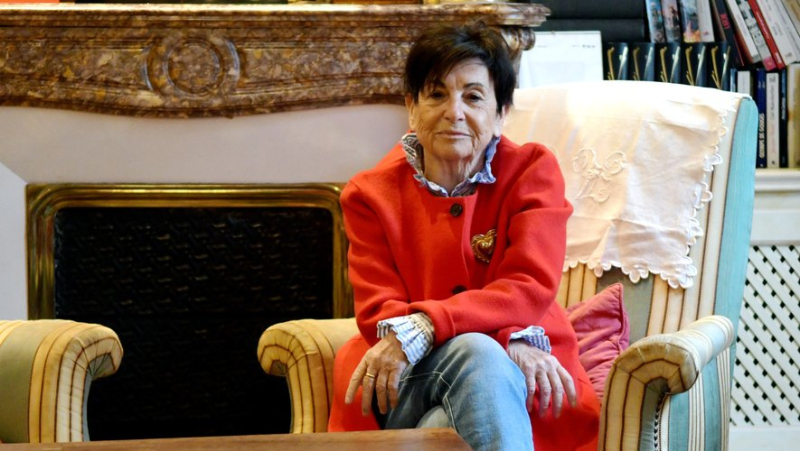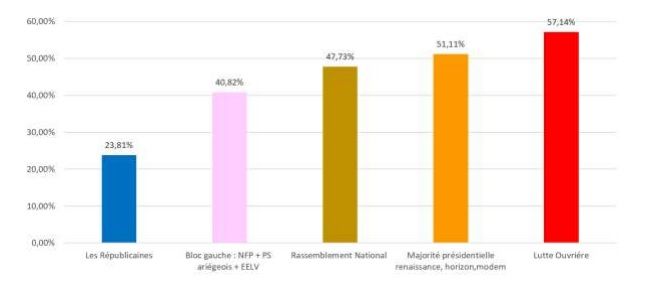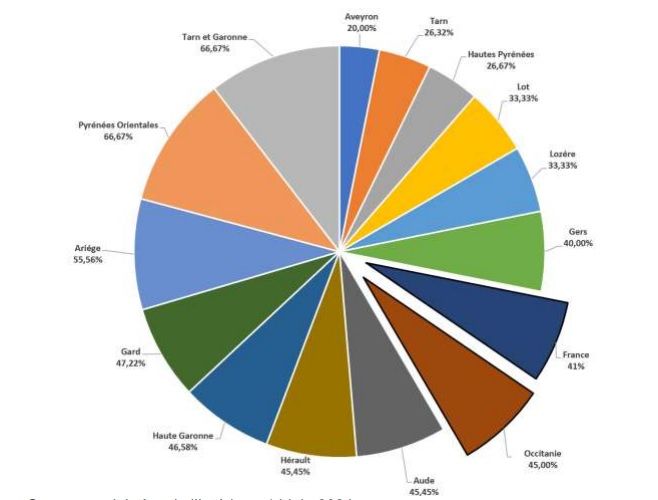Legislative elections: 45% female candidates in Occitania… “Parity training” in the region, the tree that hides the forest

Geneviève Tapié analyzes the parity figures at each election. Midi Libre – MICHAEL ESDOURRUBAILH
The Parity Observatory has calculated that 45% of legislative candidates in Occitania are women. But hindsight, at the national level or in the parties, reminds us that there is still a way to go on the issue.
Of the 316 candidates running for one of the 49 seats in the national assembly allocated to Occitania, how many women are there?? "141", replies Geneviève Tapié. At each legislative election, the president of the Regional Parity Observatory reviews the candidates, by department and by party. With this first observation, Occitanie remains a good student in terms of parity. "45 % of candidates, this is better than in 2022 (43 %) and four points above the national average which is falling again at 41 %", she observes. No surprise for Geneviève Tapié who recalls "the Occitan exception and its equal training. One president of the regional council (Carole Delga) and five at the head of departments (Ariège, Aude, Gard, Lozère, Pyrénées- Orientales), this makes it possible to legitimize the place of women in political formations", she analyzes.
A satisfaction quickly nuanced. Firstly because within the region itself, there are strong contrasts from Tarn-et-Garonne and Pyrénées-Orientales (66% of candidates), at the top of the list, to l’Aveyron, "donkey cap of parity" with 80 %… men on the starting line. And because, from one election to the next, there have also been strong setbacks. "The Tarn, which held first place in 2022, only has 26% of women candidates", notes Geneviève Tapié, who deplores that these ladies were "sacrificed for device deals".

The proportion of women candidates in the region by party. Regional parity observatory – source Ministry of the Interior
60% of men on the left
The activist also notes that if the presidential majority has 51% female candidates, the New Popular Front "which historically carries the values of gender equality, limits its efforts by presenting more than 60% of men". She makes a historical reading of it. "In times of crisis, women are always the first to be sacrificed. In 1914, the suffragists were on the verge of victory, but it was explained to them that for the best interests of France, they would have to wait to obtain the right to vote. I do not think that the Popular Front has the will to set aside parity, but the apparatus agreements, often in the hands of men, come first.

The proportion of women candidates in the region by department. Regional parity observatory – source Ministry of the Interior
What also worries him is the number of women invested by the National Rally in Occitanie. "52 % of men, compared to 50 % in 2022, this suggests that the weight of its female representation is gradually crumbling as the doors of power open", dissects Ms. Tapié, fearing for the cause in the event of an absolute majority of the RN. " Her program for gender equality can hardly worry me since there is none", she quips, before calling back"the attacks on women's freedom in Hungary or Poland when the extreme right came to power there". CQFD ?< /p>
Not restrictive enough
In the meantime, she takes advantage of this observation to recall this fight that has driven her for decades. "Since 1998, the Constitution "favors" parity, when it would have been necessary to use the term "guaranteed". But Lionel Jospin, at the time Prime Minister, explained to me later that President Chirac would have opposed his reform with this notion. Some parties take advantage of it.
If they do not play the parity game, they are in fact financially penalized by a withholding on public aid "which can go up to 75 %. But those who have the means prefer sanctions to parity. The law must not be incentive but constraining".
And the quality of the investitures ?
There is another element on which it is difficult to influence by law, "the quality of investitures granted to women". Not long ago, we saw certain parties positioning women in constituencies deemed unwinnable. In 2022, at the national level, while 44.2% of them were candidates, there were ultimately only 37.7% of female deputies. The gap was smaller in Occitania, with 42.9% elected to 43% female candidates. That is, 23 women sitting on 49 seats, 10 on the Languedoc-Roussillon side (out of 23), 13 (out of 26) in Midi-Pyrénées.
What will happen on the evening of July 7 ? Geneviève Tapié is hardly optimistic. "We will have a first indication after the first round, but I fear further setback.
I subscribe to read more




